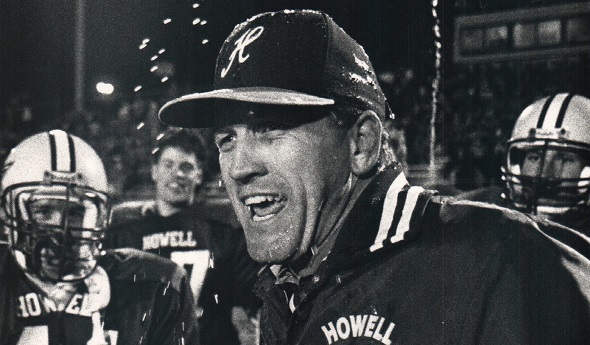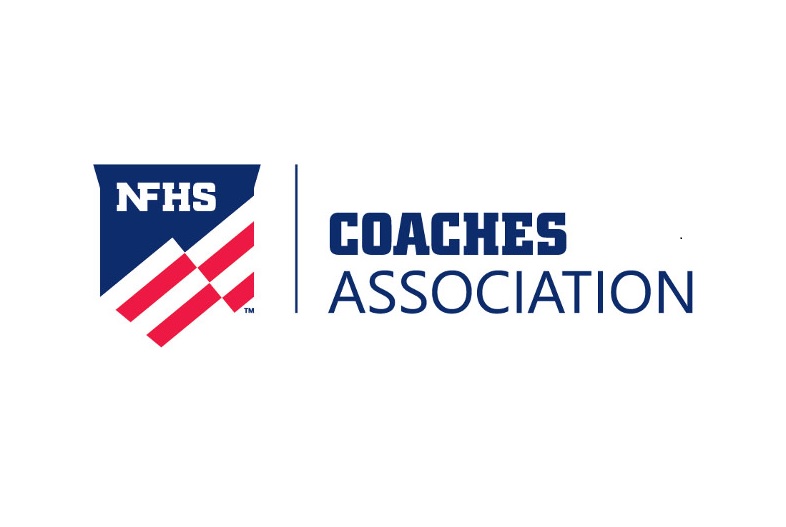
Howell Names Field for Longtime Leader
August 30, 2018
By Tim Robinson
Special for Second Half
If you got the impression that John Dukes has been around Howell football forever, you wouldn’t be far off.
 His association with the program began before high school.
His association with the program began before high school.
“When I was a kid, I used to live near Page Field (Howell’s former athletic complex), and I would go out and watch football practice,” Dukes said. “I was at practice all the time, and the coach said, ‘If you’re going to be here all the time, you may as well get some water for the boys while they’re practicing.’”
That was in 1963, when the Highlanders went 9-0.
A little more than 55 years later, Dukes will be honored tonight when the field at Howell’s Memorial Stadium will be named John Dukes Field.
Howell football coach Aaron Metz began the drive to name the field after Dukes when it was determined the old turf, installed in 2004, needed to be replaced.
“We have a commitment award named for John,” he said. “If you play football for four years, you get the John Dukes Commitment Award. We put a committee together with people who have been around Howell for a long time, and when you ask anybody, they say there’s not a person more deserving than John Dukes.
“So I ran it up the ladder to the athletic director and superintendent, and, to be honest, it was a pretty easy process because no one could find anything bad about John,” Metz added. “We’re excited to have the opportunity to do it.”
Dukes was a three-year varsity player at Howell and then played at Alma College, where his teams won three league championships.
With the exception of six years at Hartland coaching under his son, Marcus, John Dukes has been affiliated with Howell football for 46 years, including 25 as the head coach.
After graduating from Alma in 1972, Dukes got a teaching job at Howell and was an assistant freshman coach for a season and a varsity assistant for two before taking over as head coach at age 25.
“My philosophy at the time was I wanted to help the kids enjoy playing football and help them to be successful at it,” he recalled. “The previous three years our record wasn’t very good. That was one of my objectives, was to make it fun.”
He then talked about his first season with a little self-deprecation, a common thread in most conversations with Dukes.
“I remember my first game,” he said. “Because I played defense in college (Dukes was a linebacker), I thought we were going to be a really good defensive team. We played Fenton in my first game, and we lost 32-19, so my defensive prowess wasn’t good at the time.”
The Highlanders lost six of their first seven games that season, but won the last two and went 8-1 three seasons later.
In all, Howell had winning records in 15 of his 25 seasons, but one group of players stood out for an entirely different reason.
“We had a period of time (1989 and 1990) where we weren’t very good, and we lost 17 games in a row,” he said. “But those kids were wonderful kids to coach. They came to practice with energy all the time, and from a coaching standpoint, it was wonderful to coach them during the week. Now, Fridays were a different story, because we didn’t play very well on Fridays, ever.
 “But the real thing that stands out with that group was the very last game of their senior year we beat (Waterford Kettering), and you’d have thought we’d won the Super Bowl,” Dukes continued. “Those kids who were seniors, that was their first football victory in high school. It was an amazing time. We had several teams with good players, and I really enjoyed coaching them, too, and I don’t want to leave them out. But that really stood out in my mind, in that they came out to work every day.
“But the real thing that stands out with that group was the very last game of their senior year we beat (Waterford Kettering), and you’d have thought we’d won the Super Bowl,” Dukes continued. “Those kids who were seniors, that was their first football victory in high school. It was an amazing time. We had several teams with good players, and I really enjoyed coaching them, too, and I don’t want to leave them out. But that really stood out in my mind, in that they came out to work every day.
“Over a period of time of losing that many games, sometimes, it’s not fun and it’s not fun for them or the coaches. But we had a very enjoyable time over that two-year period, regardless of the fact we didn’t win any games.”
His perspective is consistent with the principles by which he ran his program.
“These weren’t original to me,” he says, “but the three things I always told our kids was your faith should be your number one priority, your family should be your number two priority. Football, when school hadn’t started, should be number three. And when school started, school became three and football became number four. We tried to base everything we did on these priorities in our lives. Sometimes those things cross over and mix and match. When they do, then you have to step back and say what is really important here?”
Dukes resigned after the 1999 season.
“There were a lot of things and I don’t know if anything in particular,” he said of his decision. “I had been doing it for 25 years, and we had a string of years where we were 6-3. So we were OK, but I felt it was time to be done with it.”
His self-imposed exile lasted one season. He had a couple of stints as an assistant coach when he finally decided to retire for good in 2006.
“No sooner had I done that, my son (Marcus) called me up and said he just got the Hartland job,” Dukes recalled. “He said, ‘Dad, you have to come here and help.’ So I went there for six years. Then he resigned, and I thought I was going to be done again.”
After another stint as a Howell assistant, John Dukes took the last two years off before agreeing to rejoin the program as a junior varsity assistant this season, as the offensive coordinator.
As it turns out, one grandson, Jackson Dukes, plays on the Howell JV, and John Dukes also is helping coach another grandson, Colin Lassey, on his junior football team.
“When Jackson gets home, I ask him, ‘Did you get yelled at by Grandpa today?” Josh Dukes says. “And when he says yes, I say, ‘Good. You should be getting yelled at.’ So nothing has changed in the 30 years since high school.”
Josh Dukes, the oldest of John Dukes’ three children, joined Marcus in playing football for their father.
“There was never an expectation that we had to be this or that,” Josh Dukes said of himself, his brother and sister, Carrie. “Now maybe he was a little harder on me, but that’s something we were thankful for. I’d rather him be harder on me than any kid on the field, because then the other kids left me alone. They knew it was the same for everyone across the board. He wasn’t going to take it easy on me, my brother or my sister.”
John Dukes coached his daughter, Carrie, when she played middle school basketball.
“The first time he coached me, he came home to my mom and said, ‘I don’t know how people do this,’” she recalled. “‘They’re all crying, half of them don’t think I like them. I don’t know how to do this with girls. It’s a totally different ballgame.’ But he was a great coach. I know some people don’t like their parents coaching them, but I loved having him coach.”
Like her brothers, Carrie Lassey stayed involved with sports. She is now the athletic director at St. Joseph Catholic School in Howell.
“He coached my freshman team a couple of years ago,” she said. “It was third and fourth-grade girls. It’s amazing. He can coach pretty much anybody.”
Indeed, Dukes also coached baseball and wrestling at the varsity level at Howell, and, for a couple of weeks, filled in as a competitive cheer coach when the Highlanders had a temporary vacancy.
“I was more a supervisor,” he said, but serving that role illustrated his commitment to the athletic program as a whole. He was needed, and he stepped in.
 Having stopped and started his career so many times, Dukes, now 68, laughs when asked about what he will do when he retires in the distant future.
Having stopped and started his career so many times, Dukes, now 68, laughs when asked about what he will do when he retires in the distant future.
“I’m sure he’ll be coaching when he’s in his 90s. Maybe triple digits,” jokes Bill Murray, the former Brighton coach who matched up with Dukes’ teams during the second half of Dukes’ Howell tenure. “The guy loves the game, he’s out there and he has a lot to offer. His teams were always well-prepared, they played great defense, were fundamentally sound and when you went nose-to-nose, they were consistent as to what they were going to do. It was a matter of whether you could stop them or not.”
Dukes still keeps up with the Howell varsity, still offers advice when asked, and still enjoys the competition.
“For me, as a head coach, it’s great having a coach (on staff) who has been there and done it to talk to and mentor, even me,” Metz said. “What makes a successful coach, I don’t think, changes, whether it’s been 50 or 100 years ago to the current day. He steered the ship to have an outstanding record (130-95) and also have a huge impact on kids in our community.”
“When people talk to me about my dad, they say he was a dad to them, or like a second dad,” Josh Dukes added. “Or, ‘I wanted to be a teacher because of him.’ These are the things that for us,” referring to his siblings, “is the most impressive part. The kids of players he’s coached, or the grandkids.”
Dukes has the unusual distinction of having coached more congressmen (Mike Rogers and Mark Schauer, who started on the offensive line for Dukes in the late 1970s) than pro football players (Jon Mack, who played for the Michigan Panthers of the USFL in 1984).
John Dukes will give a short speech before tonight’s ceremony, which will take place before Howell’s home opener against Plymouth.
“They’ve given me five minutes, but it will probably be shorter because they want to get the game started on time,” he joked.
“It’s an incredible honor,” Josh Dukes said. “Everyone in our family feels the same way. I don’t think he ever went into this with any intentions of being singled out. It’s a great lesson for our community and our athletes, to see what hard work and effort and care for your community can do, you know?”
During the ceremony, the letters “John Dukes Field,” which were sewn into the artificial turf in Howell’s Vegas Gold, will be unveiled.
“Aaron showed it to me last week when they were putting it in,” John Dukes said, then joked, “I thought (the lettering) was going to be a little trademark sign (sized), and my goodness, it’s bigger than the numbers. It’s a little bit ostentatious for me, I think; wow, that’s quite a tribute. I’m very humbled by it and honored by it and very appreciative of what people have done to make this happen.”
A few days later, Dukes posed for a picture next to his name on the field and chatted with a reporter as they left the stadium.
Then, he turned a corner to the JV football office and kept walking.
Before he became a living legend, John Dukes was a football coach, and there’s a game coming up and his team to prepare.
PHOTOS: (Top) Howell coach John Dukes celebrates his team’s 38-0 playoff victory over Wayne Memorial in 1992. (Middle) Dukes, during the 1991 season. (Below) Dukes stands next to the lettering that will be unveiled Thursday when the school’s field is named in his honor. (Photos taken or collected by Tim Robinson.)

3 Michigan Leaders Earn NFHS National 'Coach of the Year' Honors
By
Geoff Kimmerly
MHSAA.com senior editor
January 18, 2022
Three Michigan high school varsity coaches have been recognized among 23 National Coaches of the Year for 2020-21 by the National Federation of State High School Associations (NHFS) Coaches Association.
Ann Arbor Pioneer girls swimming & diving coach Stefanie Kerska, Bronson volleyball coach Jean LaClair and DeWitt football coach Rob Zimmerman were selected by a committee including representatives from all eight NFHS sections – Michigan is part of Section 4 with Illinois, Indiana, Iowa and Wisconsin.
The following brief bios includes an excerpt from each honoree’s coaching philosophy, which nominees were asked to submit after being identified as candidates for the awards.
 Stefanie Kerska took over both the Ann Arbor Pioneer girls and boys swimming & diving programs during the 2014-15 school year, and she has led the girls to the last two Lower Peninsula Division 1 Finals championships; her 2020 team doubled up the runner-up’s score with 368 points, and this fall’s team climbed even higher with 405.5 points at the season-ending meet. She also led the girls team to a runner-up Finals finish in 2019 and the boys team to last season’s LPD1 Finals championship. Kerska previously served as an assistant coach at University of Michigan from 1997-2012 and on the USA Swimming national team staff from 2008-16. She remains active with USA Swimming, the FINA Swimming Development Team and as a presenter for the Summit for Empowering Women in Swim. She was named the Michigan Interscholastic Swim Coaches Association Coach of the Year for both Division 1 girls and boys during the 2020-21 school year.
Stefanie Kerska took over both the Ann Arbor Pioneer girls and boys swimming & diving programs during the 2014-15 school year, and she has led the girls to the last two Lower Peninsula Division 1 Finals championships; her 2020 team doubled up the runner-up’s score with 368 points, and this fall’s team climbed even higher with 405.5 points at the season-ending meet. She also led the girls team to a runner-up Finals finish in 2019 and the boys team to last season’s LPD1 Finals championship. Kerska previously served as an assistant coach at University of Michigan from 1997-2012 and on the USA Swimming national team staff from 2008-16. She remains active with USA Swimming, the FINA Swimming Development Team and as a presenter for the Summit for Empowering Women in Swim. She was named the Michigan Interscholastic Swim Coaches Association Coach of the Year for both Division 1 girls and boys during the 2020-21 school year.
“Athletics starts with a belief in belonging and making every team member feel safe and valued. Teammates should depend on coaches and each other for support, guidance and motivation to be the best they can be. Athletics should create an environment where effort, attitude and dependability are valued and required for success. It is often said that athletics builds character. I, however, believe it reveals it.”
 Jean LaClair ranks fourth in Michigan high school volleyball coaching history for varsity victories with a record of 1,289-398-99 having led Midland Dow from 1988-90, Pinconning from 1997-99 and Bronson beginning with the 2000-01 winter season. She’s coached Bronson to five MHSAA Finals championships – including four straight in Class C/Division 3 from 2015-18 – and her last two teams have reached the Division 3 Quarterfinals and Regional Semifinals, respectively. She is a longtime executive board member of the Michigan Interscholastic Volleyball Coaches Association and has served as president, and was a 2017 inductee to the Michigan High School Coaches Association’s Hall of Fame. She also serves as Bronson’s athletic director and has received both the MHSAA’s Women In Sports Leadership Award and Allen W. Bush Award.
Jean LaClair ranks fourth in Michigan high school volleyball coaching history for varsity victories with a record of 1,289-398-99 having led Midland Dow from 1988-90, Pinconning from 1997-99 and Bronson beginning with the 2000-01 winter season. She’s coached Bronson to five MHSAA Finals championships – including four straight in Class C/Division 3 from 2015-18 – and her last two teams have reached the Division 3 Quarterfinals and Regional Semifinals, respectively. She is a longtime executive board member of the Michigan Interscholastic Volleyball Coaches Association and has served as president, and was a 2017 inductee to the Michigan High School Coaches Association’s Hall of Fame. She also serves as Bronson’s athletic director and has received both the MHSAA’s Women In Sports Leadership Award and Allen W. Bush Award.
“High school athletics should be a lifelong, fun experience for our student-athletes where they learn what it takes to be a part of a team, what it means to work hard for the team. Those who play competitive spots in high school demonstrate more confidence, leadership and self-respect. They learn to set goals and manage their time! They have a better appreciation for diversity and a more developed sense of morality. These are all reasons why athletics are important, and I love working with our kids to make them better leaders for the community and world.”
 Rob Zimmerman led DeWitt to the last two Division 3 championship games and the Panthers’ first MHSAA Finals title to cap the 2020 season with a 12-0 record. He’s built a 241-67 record coaching DeWitt’s varsity since 1999 after previously coaching the varsity at Cedar Springs from 1996-98. He also has served as a head varsity track & field coach and middle school wrestling coach during his tenure in school sports, and he has served as both a regional director and on the executive board for the Michigan High School Football Coaches Association. His teams total have played in six MHSAA Finals, to go with 19 league, 14 District and 12 Regional titles during his 23 seasons at DeWitt. He has five times received statewide Coach of the Year recognition from The Associated Press, and in 2020 was named the state Dream Team Coach of the Year by both the Detroit Free Press and MHSFCA and state Coach of the Year by the MHSCA and Detroit Lions.
Rob Zimmerman led DeWitt to the last two Division 3 championship games and the Panthers’ first MHSAA Finals title to cap the 2020 season with a 12-0 record. He’s built a 241-67 record coaching DeWitt’s varsity since 1999 after previously coaching the varsity at Cedar Springs from 1996-98. He also has served as a head varsity track & field coach and middle school wrestling coach during his tenure in school sports, and he has served as both a regional director and on the executive board for the Michigan High School Football Coaches Association. His teams total have played in six MHSAA Finals, to go with 19 league, 14 District and 12 Regional titles during his 23 seasons at DeWitt. He has five times received statewide Coach of the Year recognition from The Associated Press, and in 2020 was named the state Dream Team Coach of the Year by both the Detroit Free Press and MHSFCA and state Coach of the Year by the MHSCA and Detroit Lions.
“In an ever-changing world that poses more social and emotional challenges for young people than ever before, systems that can provide a foundational support and teach high levels of collaboration, discipline, accountability and relationships are more important that ever. Athletics provides young people the opportunity to foster and cultivate these key traits that are crucial for their development. For future success, students need to be equipped to handle a variety of diverse situations and work with a variety of diverse people. This is sports at its core.”
Rockford wrestling coach Brian Richardson was honored in Section 4 after leading the Rams to the Division 1 Semifinals and a 20-4 record.
The NFHS has been recognizing coaches through an awards program since 1982.

